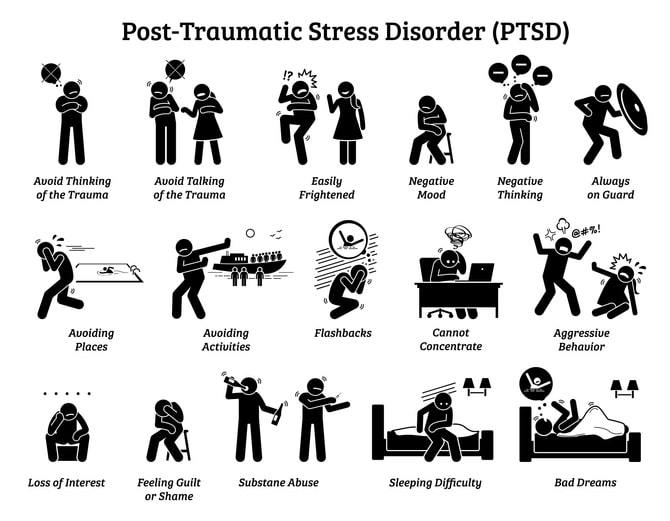If you’ve had a traumatic experience lately, your mind and body need time to recover. If you’ve had a traumatic experience in the past, you may still be affected by the event even now.
A “traumatic experience” qualifies as an event or series of events that have profoundly scared or hurt you in some way—a car accident, assault, abusive relationship, etc.
It’s not uncommon or abnormal to require some time and help to adjust to life again after the fact. The stress created from traumatic event can fade away over time, or it can last for years in the form of Post Traumatic Stress Disorder (PTSD).
If you think you might have PTSD, here are a few signs to watch out for.
How to Recognize the Signs of Psychological Trauma
Because experiencing trauma activates the fight-or-flight mode, you may be living in a state of anxiety. As a result, it’s vital to practice self-awareness. Even documenting your everyday thoughts and actions will help you to spot some of the following symptoms you might otherwise try to ignore.
Disturbing Memories
You may experience recurring and stressful memories of the event. Sometimes you might even feel as though you are reliving the event, which psychologists call flashbacks. These can happen at any time.
Frequent Nightmares
Similar to flashbacks, nightmares about the event may happen regularly. These dreams may be upsetting and make you afraid of going to sleep at night.
Experiencing Triggers
You may find yourself reminded of the traumatic event by a certain song, smell, person or environment. For example, if you were in a serious car accident after being hit by a red car, you may notice your heart rate increasing any time you see a red car (even if it’s not that red car).
Practicing Avoidance
If you’re afraid of situations that may cause triggers, you might avoid activities and places that you used to enjoy. Harder still, you may try to avoid certain thoughts that remind you of the event.
The problem is, this can have the unintended effect of creating an “elephant in the room.” The more you try to avoid the thoughts, the more you end up thinking them. It’s the ultimate Catch-22.
Persistent Negative Mood
Surviving a trauma may cause you to have negative thoughts about yourself or about the world. You may feel hopeless about your future, not sure if you can stay safe.
Perhaps you’re experiencing a sense of detachment from your family, close friends, or your significant other. As a result, you have isolated yourself from those who can possibly help you through this awful experience.
Signs of Depression
PTSD tends to mimic signs of depression. You may feel guilty about feeling happy or intense survivor’s guilt. Or maybe you’ve been having trouble feeling much of anything at all.
If you could describe your emotions, perhaps the first word that comes to mind is “numb.” Nothing seems to affect you anymore, positively or negatively.
Heightened Sense of Arousal
On the other end of the emotional spectrum, perhaps you feel your emotions a bit more intensely than you used to. Every little sound might make you jump. You might feel that you have to always be on guard against danger. Anxieties might be extra sensitive, even in situations that are completely benign.
Suicidal Thoughts
At worst, PTSD symptoms can trigger suicidal thoughts. Talking to a mental health professional or someone else that you trust, can help you work through these feelings and thoughts.
When Should You Seek Help?
If your trauma symptoms persist for longer than a month and are affecting your ability to function, you may want to reach out to a therapist. Treatment for Trauma/PTSD can help resolve the trauma at a physiological and spiritual level so that you can get your life back.
Things may seem hopeless right now, but you can begin to feel good again.
A therapist can help you better understand the symptoms you’ve been experiencing and help you rebuild your life. If you would like to set up a free consultation to see how I might be able to help you, please contact me soon.

